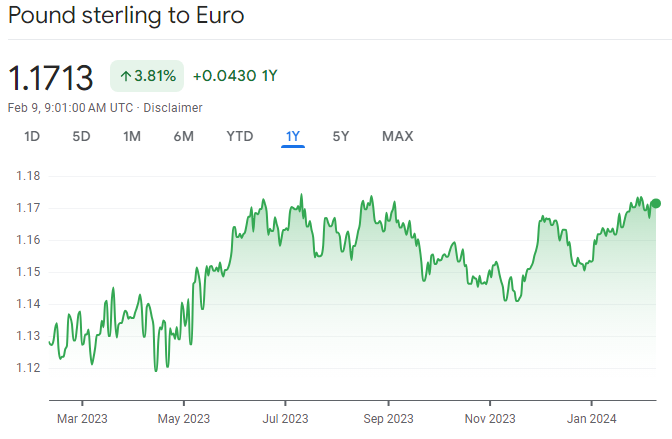Currency forwards are very simply a buy now, pay later form of currency transaction. There are many ways to protect yourself from FX price moves, but the most popular for people buying holiday homes or managing business currency exchange rate exposure is to use a currency forward.
Most currency brokers offer currency forwards service as standard, so in this guide, we look at a few things to look out for to make sure you get the best currency-forward deal.
What are currency forward contracts?
If you need to buy or sell a large amount of foreign currency for a foreign property purchase or sale in the future currency forwards let you lock in an exchange rate for up to a year in advance on a buy now pay later basis. You have to put down a small deposit to cover market movements in the meantime and the balance is due on settlement.

How do currency forwards work?
Basically, you convert money either online or over the phone as though it was a normal same day conversion. However, as the settlement date will be in the future the pricing will be slightly different. It may be in your favour or against you depending the interest rates of the two currency countries.
So, for example if you want to lock in the current GBPEUR rates for a purchase of 100,000 Euros, you would buy 100,000 Euros, but instead of paying the GBP you only pay 5% as a deposit, then the balance when the trade settles, this could be any point up to a year in advance for most currency forward brokers.
You must always take delivery of the currency with a forward contract. So for those who don’t need the actual currency, but just want to offset potential adverse currency movements there are a few guides on options and futures brokers to consider.
How are currency forward prices calculated?
It is very complicated to calculate forward currency contract prices, as they are based on the current spot exchange rate is adjusted by the ratio of the sum of the foreign currency domestic interest rate multiplied by the time to maturity to the sum of one and the domestic interest rate multiplied by the time to maturity reflecting the interest rate differential between two currencies over a specified period.
However, clients of currency brokers can request a currency forward quote without knowing the currency forward contract pricing formula by:
- Requesting a currency forward via our online quote request form
- Giving experienced dealers a call at one of our currency broker partners
- Emailing any of these currency forward brokers with your currency forward amounts, currencies and dates
- It’s worth noting that all currency forward quotes are indicative. To get a firm quote you need to have an active and approved account.
Hedging with forward currency contracts
Currency hedging forward contracts are really very simple. They allow either individuals or businesses with exposure to currency risk to protect themselves from adverse moves in the foreign exchange market.
The main thing to consider when looking at hedging currency exposure with forward contracts is your appetite for risk.
If you are very risk-averse and like to budget precisely then a forward contract is probably the most effective way to hedge. However, if you are not averse to taking some risk on your currency exposure there are other currency hedging tools that can be used.
Here is a forward contract hedge example that demonstrates how a currency forward can be used.
In this example we will look at a UK based business who’s European subsidiary will be receiving EUR 750,000 for a new contract and how a FX forward can be used to hedge the exposure.
The EUR 750,000 will be main in monthly instalments over the next 12 months and is guaranteed revenue.
In this forward contract hedge example we will assume that the company has budgeted in their profit forecasts based on the current exchange rate so they need to hedge the EUR 750,000 exposure in case the GBPEUR rate moves against them.
- This can be done by a series of currency forwards to settle in monthly intervals.
- This means that each month the company will be able to convert EUR 62,500 into GBP at the exchange rate on the day the contract was signed.
- Enabling them to accurately budget their profit forecasts.
- If the exchange rate moves against them they do not have to worry about a decrease in profits.
- However, as it is a hedge they will not benefit if the exchange rates moves in their favour over the course of the year.
Advantage of currency forward contracts
The main advantage of currency forward is reducing risk.
If you are budgeting you can use a currency forward to lock in profits on a foreign transaction or make sure that an upcoming foreign property purchase does not cost you more than the currency exchange rate.
Currency forwards generally shouldn’t cost any more in (exchange rate) fees than a normal transaction.
The advantages are clear, the most obvious being you can stop things costing you more, or make sure you don’t lose out on foreign currency due at some point in the future.
- Buy now, pay later
- Lock in the current exchange rate for a future purchase/receipt
- Hedge your exposure and reduce your risk
- Very simple to set up
- Inexpensive to maintain
- You can draw down to get currency early
- You can rollover f you don’t need funds until after the original settlement
Read our guide to preparing for a large currency transaction here
Disadvantages of currency forward contracts
Missed opportunity is the main disadvantage of currency forwards.
If you buy currency early then you miss out on exchange rates potentially moving in your favour. Of course, no one can predict where a price may be in the future so with large foreign exchange transactions it is often prudent to err on the side of caution.
The main disadvantage is of course hindsight. One thing to bear in mind when looking at currency risk protection is that hedging can work against you. However, there are only a few disadvantages, compared to the protection that a currency forward provides.
-
- If the currency moves in your favour you have missed the gains.
- The small deposit required still ties up capital
What to watch out for when using currency forwards
Live forward exchange rate quotes are not really available online, so the best thing to do it open an account with an online foreign exchange broker and request quotes using their online platform as and when you need them.
Sometimes a countries exchange rates can act in your favour and the more commission-hungry brokers will on occasion not offer this price improvement to customers, instead giving the actual spot price rather than the forward rate.
Currency forward contract examples
Here is an example of a forward exchange contract example and how it can be used by individuals and businesses.
We’ll look at two scenarios here. Firstly an example of how a forward exchange contract can be used to help protect a couple by a holiday home abroad. Then an example of how a forward exchange contract can be used to protect a business’s profit margin when ordering goods from abroad.
Personal forward exchange contract example
In this scenario, a couple are buying a holiday home in Italy for EUR 500,000. The couple have agreed on a price with the seller in Italy, but the money does not need to be paid for another 6 months. However, the couple are worried that the GBPEUR exchange rate may move against them and therefore cost them more.
- At the current exchange rate of 1.1714 (9/2/124) buying EUR 500,000 would cost £426,839.
- However, if the GBPEUR rate moved to 1.1283 (where it was a year ago) in 6 months then EUR 500,000 would cost £443,114.
- This is only a move of 3.8%, if you look at the 1-year GBPEUR chart below you can see this is quite possible.
- In this case had the couple locked in the current exchange rate they would have saved £16,304
- However, if the GBPEUR rate continues to rise, the couple would not benefit from the improved exchange rate.

Business forward exchange contract example
In the same respect, a business must protect itself from adverse currency moves. If a business buys goods from Italy with a view to selling them in the UK they can lock in the current exchange rate to protect profits.
In this instance, we shall use the same figures to demonstrate how a currency forward can protect a business’s profit margin.
- At the current exchange rate of 1.1714 (9/2/124) buying EUR 500,000 would cost £426,839.
- However, if the GBPEUR rate moved to 1.1283 (where it was a year ago) in 6 months then EUR 500,000 would cost £443,114 (a move of 3.8%)
- In this case, if the business was expecting to make a profit margin of 10% on the sale of imported goods (£42.6k). The adverse currency move would have in effect reduced their profits by £16,304, as they would have to pay £443k for their stock rather than £426k
Of course, one of the disadvantages of currency forwards is that if the exchange rate moves in your favour then you do not benefit. However:
When it comes to hedging currency exposure and risk management it is very easy to protect yourself from losing money, but very difficult to predict where the markets are heading for profit.

Richard is the founder of the Good Money Guide (formerly Good Broker Guide), one of the original investment comparison sites established in 2015. With a career spanning two decades as a broker, he brings extensive expertise and knowledge to the financial landscape.
Having worked as a broker at Investors Intelligence and a multi-asset derivatives broker at MF Global (Man Financial), Richard has acquired substantial experience in the industry. His career began as a private client stockbroker at Walker Crips and Phillip Securities (now King and Shaxson), following internships on the NYMEX oil trading floor in New York and London IPE in 2001 and 2000.
Richard’s contributions and expertise have been recognized by respected publications such as BusinessInsider, Yahoo Finance, BusinessNews.org.uk, Master Investor, Wealth Briefing, iNews, and The FT, among many others.
Under Richard’s leadership, the Good Money Guide has evolved into a valuable destination for comprehensive information and expert guidance, specialising in trading, investment, and currency exchange. His commitment to delivering high-quality insights has solidified the Good Money Guide’s standing as a well-respected resource for both customers and industry colleagues.


